#myers briggs functions
Explore tagged Tumblr posts
Text
















The 16 types as things they love
Follow me on Instagram, Facebook, Twitter, YouTube and everything else @mbtitime and @typefy
#infp#infj#enfp#enfj#16 personalities#16 personality types#16 personalidades#intp#intj#entp#entj#istp#istj#isfp#isfj#esfp#esfj#estp#estj#myers briggs#carl jung#cognitive functions
513 notes
·
View notes
Text
MBTI Color Palettes
Just color palettes I associate with each type. Just for fun.
INTJ

ENTJ

INTP

ENTP

INFJ

ENFJ

INFP

ENFP

ISTJ

ESTJ

ISFJ

ESFJ

ISTP

ESTP

ISFP

ESFP

___
MBTI notes
#mbti#colors#color palette#typology#cognitive functions#myers briggs type indicator#myers briggs#intj#entj#intp#entp#infj#enfj#infp#enfp#istj#estj#isfj#esfj#istp#estp#isfp#esfp
835 notes
·
View notes
Text

Brain Cog Volume. 1
Here's the rest of the comic ^_^ So sorry for the long wait I got a lot of things going on IRL and forgot to post the rest of this :')
Enjoy the comic! I know it's something simple and sweet but this is a project for my Comic class. PART 1 / PART 2









#mbti#main functions#Brain Cog#User#Comic#cognitive functions#intj#art#myers briggs#te#mbti art#ni#fi#se#original character#oc
74 notes
·
View notes
Text
what Ni is NOT
a lot of people in the community get Ni wrong. and i totally get that because Ni is often talked about in a super vague, weirdly prophetic light. which it is NOT.
Ni does NOT mean you can’t make connections between ideas
Ni does NOT mean you only see one truth
Ni is NOT a predictive function
all Ni is, is intuition as it makes sense to you personally. Ne, looks at the outside data and expands on that, Ni looks at the outside data and puts it in their internal framework. that’s the only difference. that Ni is personal and Ne is less personal when dealing with the abstract.
the combination of Se and Ni can come across as Ne because the user takes the tangible details and then subconsciously adds them to their mental framework. the way i personally decide between Ne and Ni is often based on this, idea. that Ni tends to be a more subconscious process, often with the user struggling to explain where the conclusion came from. Ne tends to be an obvious process. i have never once had to question where an Ne user got their idea from, because they often talk through their process unknowingly.
but just because you can’t fully understand it does NOT make Ni a sort of prophetic function. never was and never will be. it’s just the process of boiling physical things into concepts and adding said concepts to a mental framework that only makes sense to that specific person.
#mbti#mbti types#infj#introverted intuition#intj#mbti infj#personality theory#cognitive functions#typology#carl jung#myers briggs
297 notes
·
View notes
Text
MBTI - Your dominant function and your birthchart
🥑 this was inspired by an ask I got which, while I was answering it made me realise something about MBTI
🥑 this felt like too much to post as part of the answer so hope the anon who asked also finds this!
🥑 quincunxes tend to be about incompatible aspects of life, sometimes you may favor one of the other. with venus quincunx lilith, to find out whether the person with favor the venus aspects of their chart or the lilith aspects, it depends how well the placements are working
🥑 if venus is in domicile or exalted, they may most likely favor venus
🥑 if it is debilitated somehow (peregrine, fall, detriment), they will probably favor lilith simply as it is easier
🥑 in mbti people often favor their dominant two functions so if you want some real deep insight into your psyche and personality, look at your dominant function in mbti and then go and check out what planets are exalted or in domicile and you will see roughly the full 'psychic toolkit' you have to work with. what's dom or exalted will also likely flow really easily through your dominant cognitive function.
🥑 for example, I have the sun exalted in aries and am Se auxiliary (ISTP). results in me being kind of headstrong and translatinf this physically such as going into the outdoors and being very happy trekking and exploring, even somewhat scary or dangerous places
🥑 so for another example if venus was in domicile in taurus, the person in question would likely really really favor the venus aspects of their life and potentially use them to suppress their lilith. If they were (for example) an INFJ they might be super out of touch with their shadow functions and lower functions which may then express themselces violently due to suppression (e.g. binging due to being out of touch with their Se)
just some rambles.
#astrology#astroblr#astro observations#all signs#water signs#earth signs#air signs#fire signs#shadow work#mbti types#mbti astrology#typology#infj astrology#intj#infp#intp#entp#entj#enfp#enfj#cognitive function#myers briggs astrology#myers briggs
20 notes
·
View notes
Text
Most Painful Words You Can Hear:
"I never liked you".
"You are a burden".
"I wish you were never born".
"I'm an ENTP-T".
"You waste my time".
"You're so annoying".
"I share my 16 Personalities type with Satan, I'm so evil hehehe".
"You're better off dead".
"Sensors are stupid. I'm so glad I'm a sophisticated intuitive".
"I'm introverted so I'm an INFP".
"XNTJs are the most dangerous types".
#i'm salty#very salty#myers briggs#carl jung#typology#personality types#personality typology#16p#16 personalities#16 personality types#mbti types#mbti personalities#tw verbal abuse#just in case??? idk#better safe than sorry#entj personality#mbti entj#entj#infp personality#mbti infp#entp personality#mbti entp#entp#mbti intj#intj personality#intj#mbti test#mbti#cognitive functions
7 notes
·
View notes
Text
INTJ: Logical Fairness and Equal Exchange
**I can’t pinpoint the functions one by one, else this will be too lengthy, but I’ve covered mostly the primary to tertiary functions, not much on Se.** We have… Introverted Intuition (Ni-Primary), Extraverted Thinking (Te-2ndary), Introverted Feeling (Fi-Tertiary), and Extraverted Sensing (Se-Inferior)
INTJs Perception on Fairness:
We rely on logic and intuition (or a certain inner knowing). There is this thing of fairness… and fairness to us is more logical than emotional. We can see things fairly, without it affecting our feelings, we can make choices without being attached, and we won’t see it in any way as hurtful or rude. We act fairly because we believe it to be “right”, not because a certain choice uplifts us, not because we want to appear helpful, not because of pity, and not because we want others to feel indebted to us. That’s why we find accountability and integrity--- a natural and innate concept. (if we are objectively wrong, then we're simply wrong).
And, as each person is unique(regardless of MBTI), INTJs will side on either Fairness or Manipulation (in negative). INTJs who believe in equal exchange or fairness are healthy INTJs. INTJs who explicitly manipulate have a part of them that’s underdeveloped or unhealthy, especially their feeling function.
The term of fairness and equal exchange, when applied to skills for an INTJ:
The fact is that an INTJ is JUST simply an efficient and straightforward human being; we are just good at our job and knowing things… living and getting things we want, the way we want it. We know we are capable of pushing limits, but we are not overly delusional. We have our limitations, and from time to time, we challenge those limitations, because we don’t want anything holding us back, especially our own LACK and DEFICIENCIES. We don’t want OURSELVES holding us back.
Therefore, we need SKILLS to move past these limitations. Which means valuable input and training. What better way to learn than through human interaction, human insight, and being surrounded by the right people with those skills that we want.
Reverting back to “valuable”, we believe that it is healthy for humans to be INTERdependent. Because an interdependent community is where humans thrive in support and aid, which benefits all sides. EQUAL AND FAIR GIVING AND RECEIVING. If we can get information etc., from someone, then we also believe that we can offer something valuable to that someone.
Usually, skills and training are something you pay for, and when you have access to those skills via close-knit relationships, it’s much more likely for them to reject payment. INTJs can’t have that — “like, how dare we… leach off from you?! Blatant shame on us INTJs!”–we can’t face the fact that you’ll have nothing to benefit from us.
Additionally, we believe knowledge is currency; knowledge is so valuable that it is monetized. IN THIS ECONOMY?! *deep breaths* You have to at least… want to learn a thing or two from us as well.
Humans are ever evolving, skills and knowledge open you up to opportunities, in our minds… “why not take this chance of exchange, to improve each other’s skills, so that we both gain something from it, and I won’t feel like I’ve free-loaded your personal time.”
And before anyone says, “Well, ummm actually… I’ve met snobbish and selfish INTJs”... An unhealthy INTJ, on the other hand… Yes, they will think they’re far superior and untouchable… Because they haven’t developed their Fi function. They have weak philosophies in life and personal values.
INTJs are one of the most willing people to help with anything analytical, theoretical, and intellectual etc. Of course, those don’t come for free, and you should also put something on the table that you believe can prove useful to INTJ someday. (Just don’t ask them about anything feelings-related, unless you prefer brutal truths and logical discourse regarding it. Because they are fond of internalizing and rationalizing their strong inner feelings to make sense of them.)
#intj#intj female#intj thoughts#mbti intj#intj personality#mbti types#mbti#intj mbti#intj woman#intj women#intj male#intj man#mbti personality types#personality types#16 personalities#intj aesthetic#intj fairness#myers briggs#mbti personalities#enneagram#intp#infj#entp#entj#infp#enfp#psychology#mbti cognitive functions#function stacks#mbti function stacks
8 notes
·
View notes
Text
INFJ2: ...and I didn't know at the time that he meant to go on a date, but...
INFJ2: ...
INTP: ...but?
INFJ2: *bashful* I mean ...
INFJ2: ....
INFJ2: I mean ...
INFJ2: *eyes glistening, pupils wide*
INFJ2: *breathless* How often do you get the opportunity to talk to somebody educated on Degrowth and monetary policies in the Global South?
INTP: ...
INTP: ...*breaks out into laughter*
INTP: That's-
INTP: That's why you agreed to the dinner?
INTP: *wipes away tears of laughter*
INFJ2: What - I mean -
INFJ2: Is that so odd?
INTP: No, no, not all!
INTP: It's just... so wonderfully you :')
#the golden pair#mbti#cognitive functions#intp#infj#intp x infj#climate activism#degrowth#dating#myers briggs
75 notes
·
View notes
Text
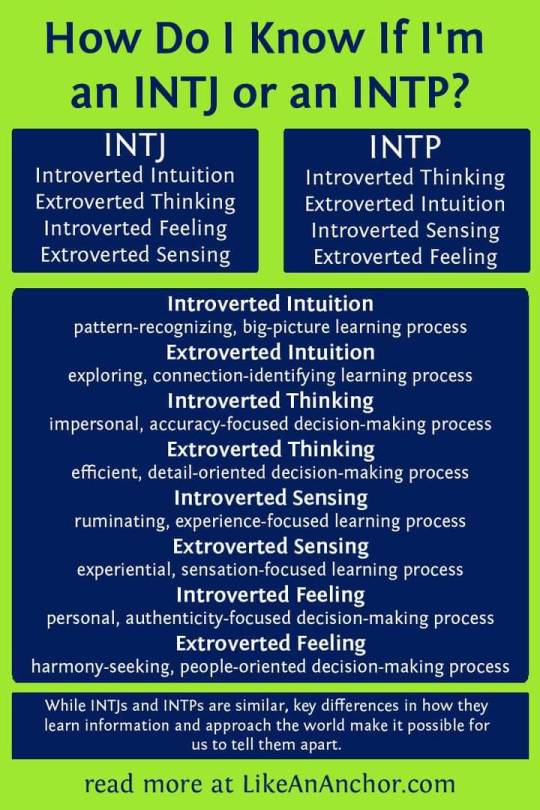
How Do I Know If I’m an INTJ or an INTP?
The way these cognitive functions work together makes INTPs and INTJs similar in some ways and very different in others. They might seem near-identical times but their underlying thought patters and motivations don’t look nearly as much alike as you might think.
J/P is a little odd for introverted types
The J/P preference describes how people relate to the outer world. J-types extrovert their judging function (T or F), while P types extrovert their perceiving function (S or N). Since INTJs and INTPs are both introverted, they lead with a function oriented toward the inner world. This means INTJs are actually a dominant perceiving type and INTPs are a dominant judging type.
If you’re an INTJ, you’ll typically find your Intuitive side is the one that feels most comfortable. Pattern-recognition, big-picture thinking, and seeing things from multiple perspectives come naturally to you. You probably place a higher value on experiencing and understanding life than on controlling it. However, others may see you as being more organized and disciplined due to your extroverted judging function.
If you’re an INTP, you’ll typically find that your Thinking side is the one that is most comfortable. Making sense of things for yourself, typically using impersonal criteria, comes naturally to you. You probably like having things and ideas settled and decided even more than you like experiencing life as it happens. However, others may see you as more unpredictable and/or spontaneous due to your extroverted perceiving function.
Your co-pilot’s influence
INTJs and INTPs both have an Intuitive function and a Thinking function as the first two in their function stack. However, each type uses those functions differently and relies on them in a different order. We’ve already looked at their dominant functions, so now it’s time for the co-pilot.
If you’re an INTJ, you support your Intuition with a Thinking side that helps you relate to the outer world and made decisions. You probably notice it most when weighing impersonal criteria for decision-making, working with facts and data, or finding ways to explain your thought processes to other people. It’s not your most comfortable process, but you can get really good at using Extroverted Thinking if you take the time to grow and develop it.
If you’re an INTP, you support your Thinking with an Intuitive side that helps you understand the outer world. You probably notice it most when you’re learning and processing information because it helps you experiment and explore to discover how things connect and what is possible. It’s not your most comfortable process, but you can get really good at using Extroverted Intuition if you take the time to grow and develop it.
You use Thinking and Intuition differently
We talked about this point already when discussing the primary and co-pilot process. It’s worth spending more time on, though, because it’s one of the most important things to understand if you want to tell INTJs and INTPs apart.
In terms of Thinking, if you’re an INTJ then your Extroverted Thinking thrives when using objective data. Collecting facts, taking measurements, and solving practical problems are second-nature to you. For INTPs, the Introverted Thinking process is more subjective (i.e. “What makes sense to me?”). You tend to ask questions and formulate theories more readily than you focus on effective real-world implementations of ideas. This doesn’t mean INTJs never theorize or INTPs are never practical. It’s more about where your primary focus lies and how you most naturally think.
In terms of Intuition, INTJs use it so naturally they may not even realize how good they are at noticing patterns, switching perspectives, and figuring out what’s “behind the curtain.” Since Intuition is your primary function it’s the one you’re most comfortable with. For INTPs, Intuition is the co-pilot process and it’s outward focused. It makes you good at coming up with new ideas and brainstorming possibilities. The way INTPs experience Intuition tends to be more exploratory, while INTJs will be more like observers.
What happens in the loop
Our co-pilot process is not oriented the same way as our primary process (i.e. it’s extroverted for introverts and introverted for extroverts). Because we tend to be more comfortable with processes that work in our preferred world we often bypass our co-pilot process and try to use our tertiary process instead. This is called a “loop.” Here’s what it looks like for INTJs and INTPs:
If you’re an INTJ, you have Introverted Intuition as your primary function and Introverted Feeling as your tertiary. When you get into a “loop,” you become more preoccupied with your personal values system. You might even find yourself making decisions based on your emotions. If you spend too much time in this loop you may loose touch with your more logical side. This can lead to becoming withdrawn, self-righteous, and hypercritical of other’s values and beliefs.
If you’re an INTP, you have Introverted Thinking as your primary function and Introverted Sensing as your tertiary. When you get into a “loop,”you may get stuck focusing on past experiences and become hyper-attentive to real-world details. You may also want verifiable, sensory facts but struggle to process them. Spending too much time in the loop can get you caught-up in the past. This can lead to trouble processing past mistakes and moving forward into the future.
How you are under stress
When people are trying to find their best-fit personality type, they often focus on figuring out which cognitive function they’re most comfortable with. But the functions that you don’t use well can also provide clues as to what personality type you are. The inferior function (the lowest on a four-function stack) typically shows up when we’re stressed. You might also use it to take a break and relax, and it often shows up in our favorite hobbies.
If you’re an INTJ, stress can bring out your inferior Extroverted Sensing. When stressed-out, you can become obsessively focused on external data, overindulge in sensory pleasures (food, drink, shopping, etc), and develop a suspicious, hostile attitude toward the outer world. You can also use this function in a healthy way, and you might find that you enjoy activities that require sensory engagement (like cooking, hiking, or painting).
If you’re an INTP, stress can bring out your inferior Extroverted Feeling. When stressed-out, you can become hypersensitive to relationships and much more emotional than usual. You might also respond to this by trying to swing the other direction and emphasize logic to an extreme. You could also use this function in a healthy way, and you might find that you enjoy activities that tap into your Feeling side (such as mentoring someone or joining an organized social group).
#myers briggs#personality test#intj#intp#intj personality#intj female#mbti intj#intp female#intp personality#intuition#intuitive#introvert#introverted#function stack#architect#mastermind#scientist
23 notes
·
View notes
Text
welcome <3
hellooooooo!!
this blog is dedicated to thought bursts of any kind! my current interests lie in MBTI (typology in general) and more recently vedic astrology. possibly some personal anecdotes as well :)
*i do want to specify that i am NOT a professional/practicing astrologer whatsoever. i am interested in it and have discovered cool things, but i cannot formally read charts or provide any sort of feedback.
2 notes
·
View notes
Text
Maedhros is an ESTJ
He is dutiful and responsible, when he argues with his father to send the ships back to the larger host of the Noldor, I believe he was considering Fingon specifically out of loyalty, sticking to his principles and ideals about the situation. Obviously this is the Te function that butts heads with his father. I don't need to go into his Te too much otherwise this would be a book-long post but is comes out in the fact that he is an excellent commander and leader.
The reason he is a sensor though is because he uses Si to guide him through middle earth. Si is what reminds him of the larger, stronger portion of the Noldor left behind in Valinor, the oath, how he strategizes, and whenever he sticks to his firmly implanted principles and logic which causes him to make big picture mistakes.
For example: His father leads a battle against Morgoth and dies. A little bit after that, Maedhros tries to overpower Morgoth again and gets captured. The big picture he missed- is that his first sole job is as King of the Noldor and to get the Silmarils back and he focused on the 'smaller 'detail of trying to overpower Morgoth on his own.
Maedhros's mind is in two places: remembering the lessons (and sufferings) of the past and planning for the near future (not far).
The Ne function is tricky but ESTJs use it a surprising amount to come up with better, more efficient, solutions to problems and we can become surprisingly inventive.
Examples: when Maedhros gives the crown to Fingolfin (which none of his brothers expected), making allies with nearly everyone (dwarves and men included), and his last desperate attempt to take the Silmarils, which cause him to spontaneously unalive himself due to despair.
(Trust me when I say, when ESTJs despair, it is caused by hopeless situations and finding ourselves in a dark places where we believe that everything that went wrong was our fault.)
The last function is Fi, and we never see Maedhros confront his own feelings through the book, his entire focus is defeating Morgoth so that all of middle earth can be at peace. But then when it became hopeless, then his eyes focused on the next attainable objective, getting back the Silmarils and fulfilling the oath (despite it being in vain).
That despair I mentioned earlier was the inferior Fi causing Maedhros to mentally break- paired in with Si is a horrible experience.
Fi may be the last function of ESTJ, but it's also ENTJ's last function. it's the same thing that caused Feanor to mentally break after his father's death, a deep seated sorrow coated with wrath (and Feanor is clearly an ENTJ). For Maedhros, it's yearning coated with stoicism.
ESTJs (being the community oriented people that they are) care about their neighbors and want to help them (mostly practically), they want everyone just to get along and not cause any drama or situations which create harm so they can work together more efficiently against the common evil (if they do see it). But they can become brutal when people become a risk/danger to their friends and neighbors.
Maedhros did not want to harm anyone, but due to PTSD and despair, he caved and learned not to care; unhealthily utilizing his Te function to its full extent.
If anyone wants to add on to this and/or disagree, feel free to! I'm guilty of not grasping the four cognitive functions completely but I wanted to get my thoughts out there. I wrote this all though the method of the cognitive functions instead of 'which personality traits match what'.
#Let me know in the comments/reblog tags if you wanna hear me ramble on how I think Maglor might be an ISFJ#maedhros#mbti#myers briggs#the 16 personalities#estj#silmarillion#the silmarillion#tolkien#cognitive functions#Ironically enough#this is the same reason why Maedhros is NOT my favorite character bc everytime I read about him-#-I wanna slap myself for making similar misjudgments and mistakes#please tell me if I made any grammatical errors as well thx
16 notes
·
View notes
Text
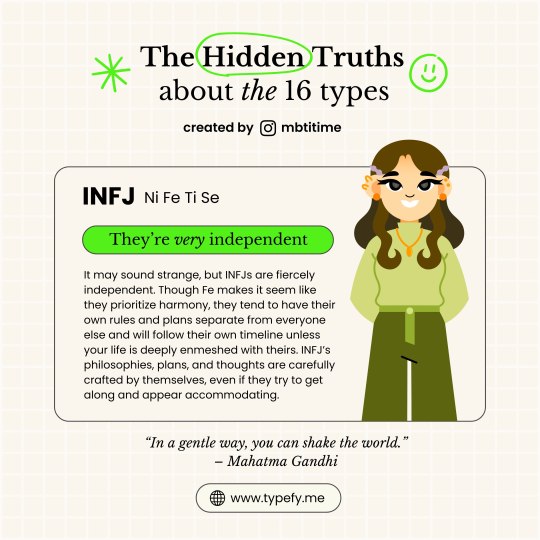
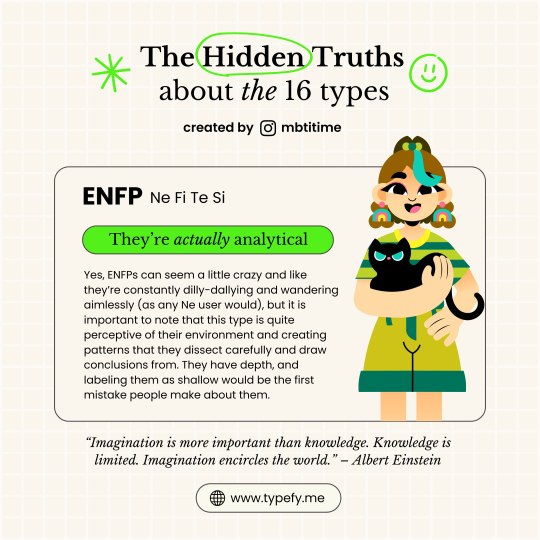
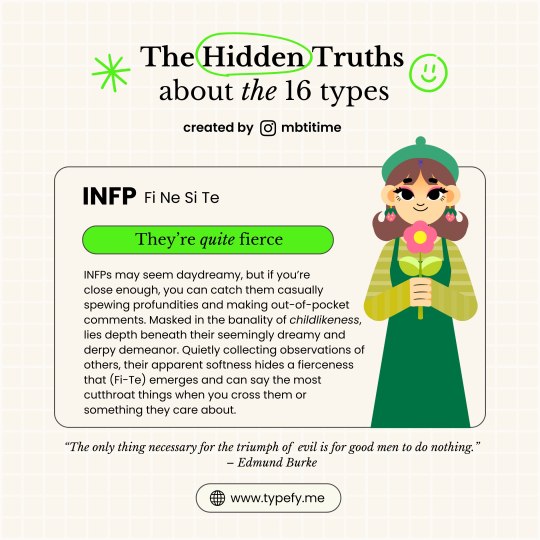
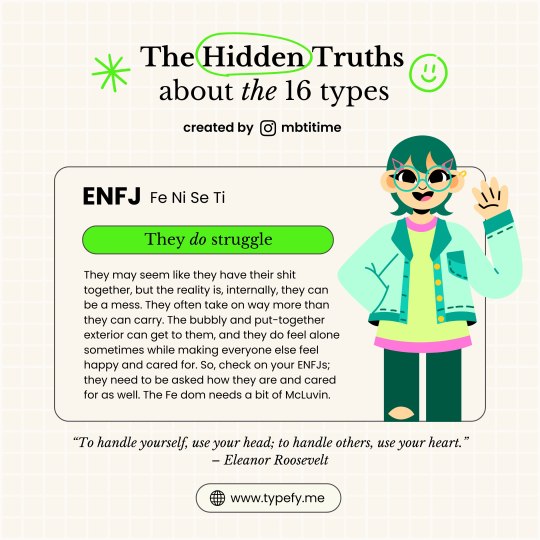
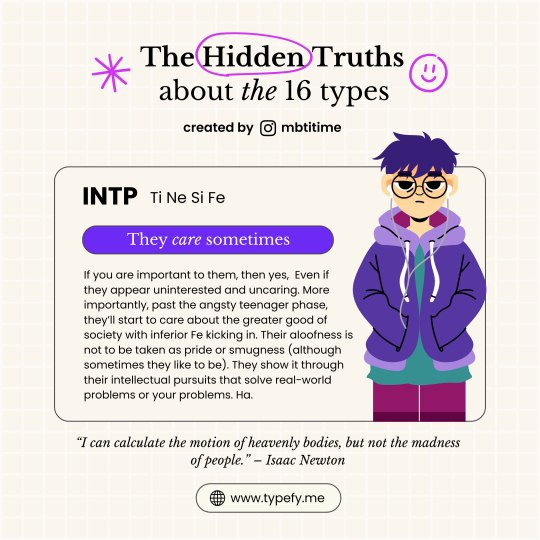
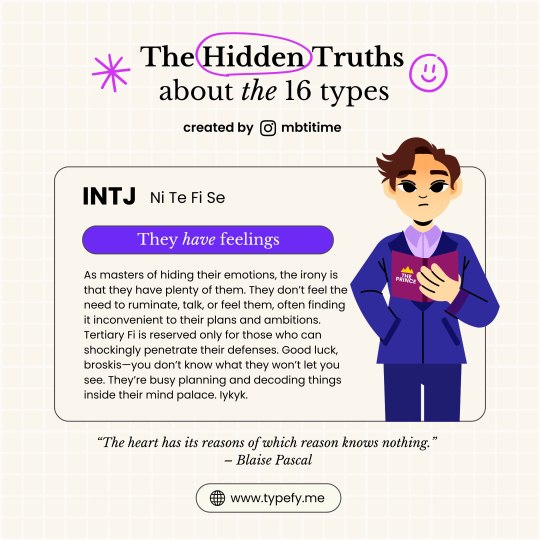
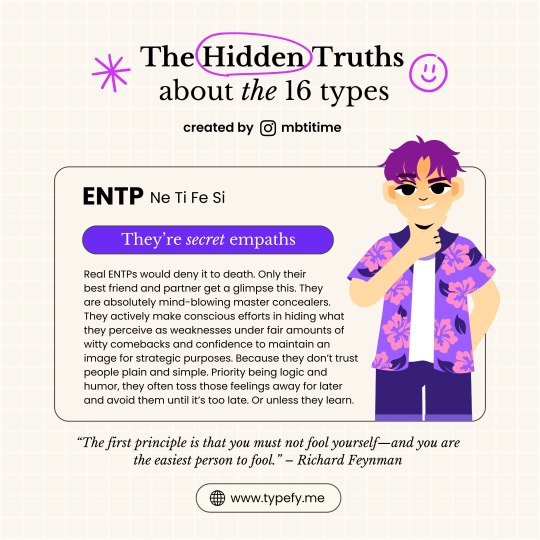
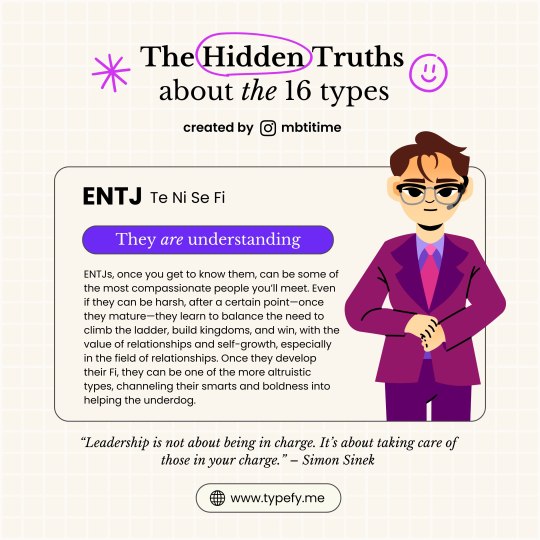
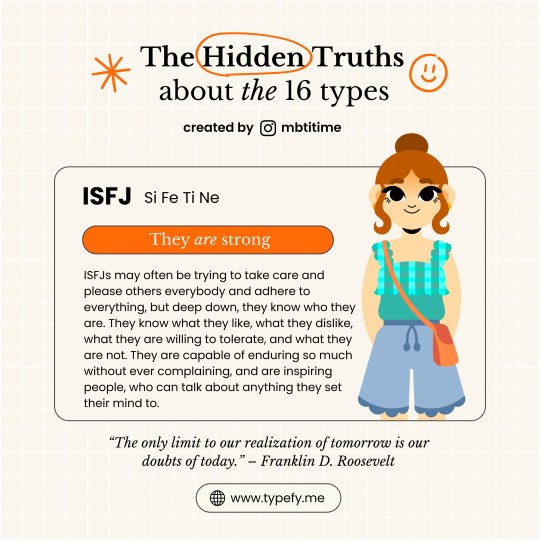
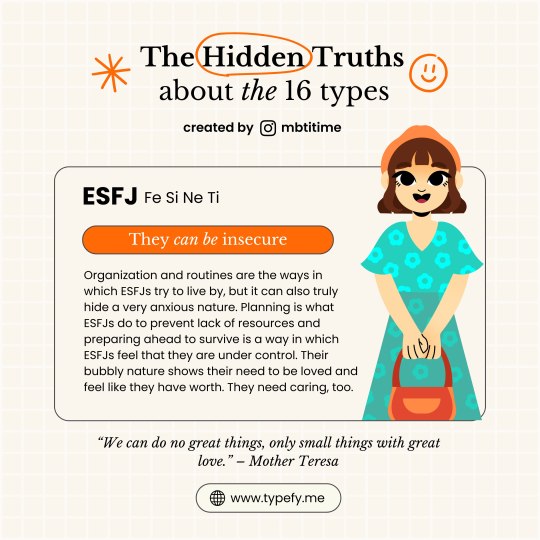
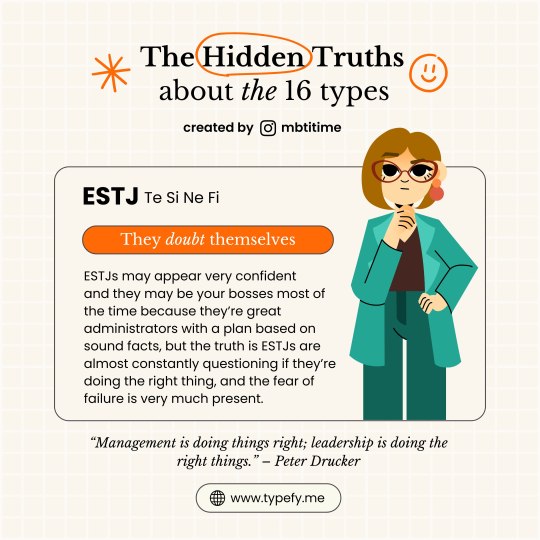
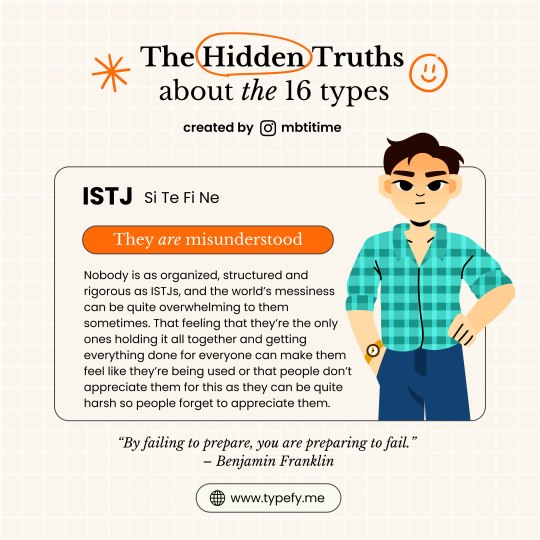
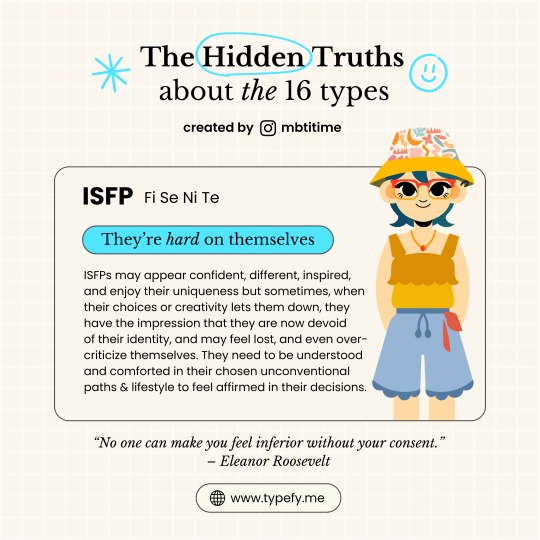
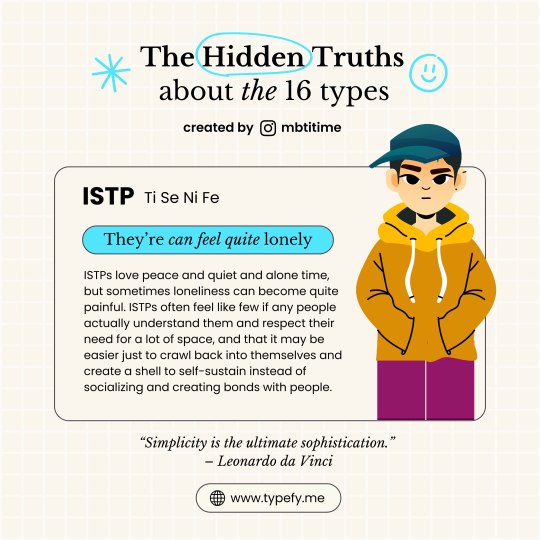
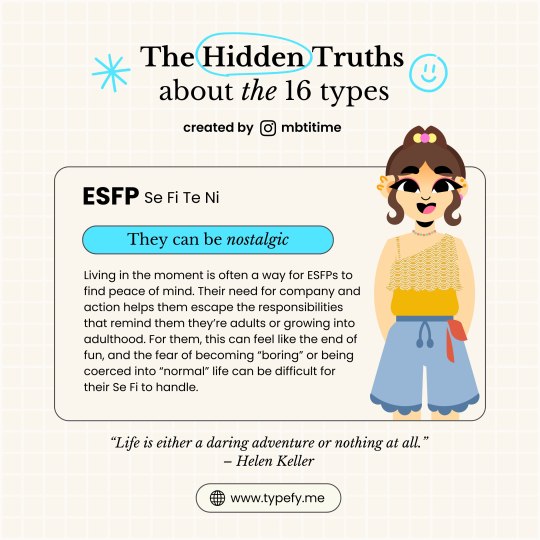
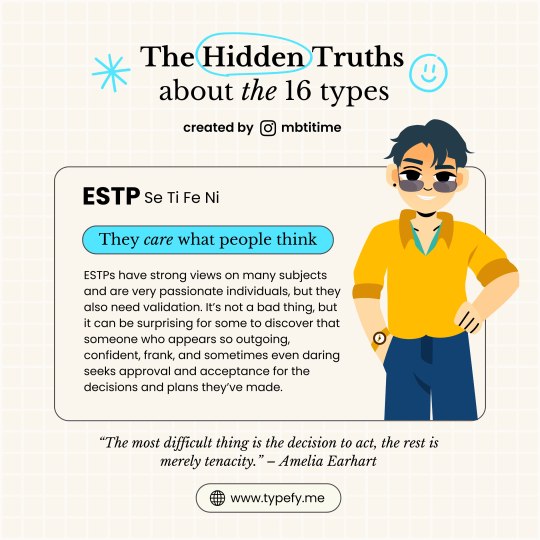
My Not-so-secret Secrets of the 16 types
Follow me on Instagram, Facebook, Twitter, YouTube and everything else @mbtitime and @typefy
#mbti#16 peresonalities#16 personalities#16 personalidades#infp#infj#enfp#enfj#intp#intj#entp#entj#isfp#istp#isfj#istj#estj#estp#esfp#esfj#carl jung#cognitive functions#myers briggs
551 notes
·
View notes
Text
MBTI Grip: Se
An explaination on function grip in MBTI. Not an expert. May change later.
___
Grips occur when a type is under an immense amount of stress. Their other functions give up mentally and "shut down", which allows their inferior function to take over. A type in the grip begins to act like the unhealthy version of their inferior function, very unlike and opposite of themselves. Grips can last for a short while or longer, depending on how long the stress persists.
___
Se inferior (INxJ)
Se inferior types may struggle to enjoy the present moment as their minds are often set on what they need to do next. They can miss obvious details and struggle with daily routine. They can also let opportunities slip by since they are often not spontaneous or risk takers - they prefer to see how a situation may go and follow through with it.
When in an Se grip, INxJ will come out of their shell but in a careless, messy way. As Se is focused on the physical sensations, a very stressed INxJ will try to cope with stress by overworking their Se. They may start to over indulge in physical sensations and pleasures such as food (especially unhealthy food) and drinking, sexually risky behavior, tv and/or on their phones (screen time in general), drugs, sleeping time away, etc any unusual thrill seeking and risky behavior is part of the Se grip.
Engaging with the auxiliary function helps to alleviate the stress and to gradually break out of the grip. For INTJs, they have to use their Te; need to create plans and goals to achieve things to boost their focus and confidence. For INFJs, they have to use their Fe; engage with others, work on and improve their relationships with others. Both types should focus on setting realistic goals and expectations for themselves when trying to get out of a grip. Doing too much and having high expectations will likely result in failure and disappointment, only pushing themselves further into their grip. They need to learn to use Se to relax and to support their Ni and aux rather than a distraction.
___
MBTI list
#mbti#typology#cognitive functions#myers briggs type indicator#myers briggs#intj#infj#se grip#extroverted sensing#inferior functions#mbti grip#inferior se
48 notes
·
View notes
Text

Brain Cog Volume. 1
Hey everyone! This is a little comic project I made with my cognitive functions gjinkas. I made this in a month for a comic class at my university, hope you enjoy this :D
Credit to my friend, Kiko for helping me with coloring. I'll be posting the comics in three different parts!
READ PART ONE HERE 👇
PART 1 / PART 2





Part 2 coming soon ヾ(≧▽≦*)o
#MBTI#MBTI art#myers briggs#Ni#Te#Dr. Myers#Art#INTJ#Main Functions#Brain Cog#User#Comic#cognitive function
52 notes
·
View notes
Text
ENFP personality type (NeFiTeSi)
THE REVOLUTIONARY; THE CHAMELEON; THE SURREALIST
translated from DDC Tipologias <3 for others types Click Here

DOMINANT FUNCTION: EXTRAVERTED INTUITION (NE)
As the dominant objective perceiving function, Extraverted Intuition brings a world of unfiltered situations to the individual. This abstract and speculative world leads the Ne-dominant to live in a sea of options and hypothetical speculations, with their connection to reality occurring through constant (re)direction toward new interests and unexpected associations that pull the ENFP away from any consistency or maintenance. There is an abrupt, almost violent shift in interests, whether short-term, medium-term, or long-term, which often radically reshapes how the ENFP sees the world. Much of their tastes or even beliefs are at risk of imminent change in favor of a new theme that seduces them to explore. The maintenance of more consistent interests or goals, though it exists, is usually small and limited to a few things that stay with them. Even these, for most ENFPs, seem at risk of some kind of internal or external change.
This makes the ENFP, while inconsistent, capable of delighting in and engaging with countless tangents of thought that facilitate the creation of new connections between concepts and possibilities, to which Introverted Feeling links as if it defined them. In other words, the need to explore connections and projects is not mere dilettantism or something the person does because they are happy or in a moment of fun. It is seen as fundamental to the ENFP's very functioning, and therefore has little to no prior filter: each new project appears with equal value and significance because it represents an equally interesting hypothetical field to explore. It is this lack of filter that demonstrates the erratic and rootless nature of dominant Extraverted Intuition, far beyond a simple interest in the "new" or "creativity." In truth, there are leaps of desires, sometimes entirely unrelated, where every new speculation is worth it simply because it is a speculation. The ENFP buys into change with equal force, which does not seem alien to them at all: it is part of their modus operandi. In a way, the ENFP only feels stable in terms of change, knowing that everything else can dissolve and vanish into thin air.
The passion for multiple and varied connections often brings a proposal of self-subversion and reimagining of oneself. Since everything interesting deserves a chance to be explored, this also means reimagining one's own foundations or attachments in a fleeting and varied way. While this generates a potential for critiquing reality through concepts and an unparalleled capacity for associations, as mentioned, it also creates a galloping inconsistency that makes it difficult to commit to various projects. The need for speculation and its utilization generates a tendency toward instability, as few things have enough intrinsic weight and value to be maintained out of love. In this case, it is common for the seduction of new tangents to create frustration due to the perception that many things must be maintained, at least out of pragmatism.
AUXILIARY FUNCTION: INTROVERTED FEELING (FI)
The ENFP's first anchor to a sense of self comes from their judging function, Introverted Feeling (Fi). Through it, the ENFP finds more identification with their tastes and desires, gains the ability to understand their own values and feelings, and also self-restricts their exploratory tendency so that it does not exceed the limits of their own individuality. The paths that are most frequent in the ENFP's exploration relate to their personal values and their firmer opinions. Whether in the pursuit of justice or the radical search for what satisfies their interests and desires, the ENFP engages, through Fi, in a "whatever it takes" logic. The personalization here is so strong that anything not important to the individual is secondary. While this does not mean selfishness at all, it demonstrates why it is rare for ENFPs to be "people-oriented."
There is also the justice-oriented side (through values) that is common in all Feeling functions. Although auxiliary Fi can generate a confrontational attitude, it usually has two characteristics in the ENFP: 1) it does not feel like it is dialoguing with some kind of universal justice or something that should be accepted by everyone. It is more common for the ENFP to be aware that their values are just their own and not try to convince others based on what they should value, but rather through dialogue with the objective logic present in the tertiary function, explained later; 2) it is little or not at all physical, usually not direct and even less factual: it begins and ends in the abstract field of ideas. Thus, the possible transgression in terms of revolt for justice in the ENFP should not be confused, even if it seems similar, with other revolts and movements for justice by other types, which are also quite common. In the ENFP, it often blends with a transgression of the self, where the ENFP remodels and reformulates their own orientations in the name of a very particular sense of self, which eventually overflows into confrontation with the external world.
TERTIARY FUNCTION: EXTRAVERTED THINKING (TE)
Extraverted Thinking is the ENFP's main axis of contact with pragmatism, bringing the capacity for objective decision-making to the type. However, its childish nature often relegates it to a mere partial and uncommitted adoption of thought structures that go beyond the individual or, conversely, to the attempt to simplistically impose/adopt them. In an attitude reminiscent of a child arguing, it is common for tertiary Te to create mediocrely solid arguments based on pieces of information that serve more to defend what has been personalized by Fi-auxiliary than to decide something impersonally. Another possible childish manifestation is the simple adoption of external thought structures or rules, such as finances or legislation, for small and non-crucial gains in the individual's life. At other times, Extraverted Thinking may appear trying to impose simple reasoning as if it were universal.
On the other hand, if better developed, tertiary Te gains possible capacity and dimension, unlike when it is inferior, where it is necessarily incapable of gaining substance. The acceptance of structures once rejected for seeming "oppressive" or too homogenizing allows the ENFP an interesting pragmatic and creative maneuvering space. The creation or adoption of the new, beyond being a form of identity or value affirmation, gains a greater capacity for dialogue with the external world, although the ENFP often gets lost in this dialogue and spends too much time alternating between structuring new creations and expanding them, without even asking if it truly interests them. By acquiring a greater ability to manage and favor gains rather than imposing personal truths in their way of exploring the world, tertiary Te, still with infantilized, slightly authoritarian undertones, can engage in producing and building with knowledge oriented toward efficiency. There is, therefore, an adaptability to external impersonal demands that would be lacking in inferior Extraverted Thinking, for example.
INFERIOR FUNCTION: INTROVERTED SENSATION (SI)
Orienting one's life toward ever-new tangents requires sacrificing what, for others, would be considered "what truly matters." Due to the definitive prevalence of Extraverted Intuition in the psyche, the ENFP subsumes and constantly belittles the idea of the eternity of things, sensations, and facts that would be important to them. If they ignore the presence of the inferior function too much, they may project it so strongly that they become bothered by any use of this function in others. Seeing that other people place great intrinsic value on objects, facts, and sensations that would ideally be maintained ad eternum brings personal discomfort to the ENFP, who sees these things as limiting, inert, or meaningless. Of course, at the same time, they attach themselves to another handful of things, even more meaningless and unnecessary, usually with no concrete value, as a transgression of the world's order. There is an inertia that refuses to understand how others imbue facts and details with fundamental value simply because they are what they are.
Such repression can lead to outbursts of the inferior function, which, unable to develop properly, generates self-destructive attachments in the individual with no degree of complexity. Often, it is the body itself that suffers from the poor understanding of facts: it becomes entangled in hypochondria and other situations where the body's own sensations cause discomfort and gravity. In other aspects, there is a galloping frustration with the history of inability to attach to certain things, which returns as an obsessive attempt to maintain certain aspects of their life, without actually having the capacity or creativity to do so. For a type that has risen by redefining things and creating new associations to maintain their interest, the ENFP suddenly finds themselves unable to expand their concepts in the abstract world, without compensating for this with healthy solidity in the concrete world. Drawing their strength from the lack of meaning in things inevitably presses on the perception of a world that has no meaning because it was never cultivated in them. The unstable inertia and attachment, then, can cause much pain.
If they realize this, the ENFP may try to better accept the complicated and unstable nature of their inferior function. Although they will not be able to give substance and complexity to the perception of things as valued in themselves, they will be less hostage to the inferior function precisely by accepting it as a field of insecurity and recreation. As it is not ignored, the ENFP better understands the limits of accelerated exploration and realizes that there are things that can be maintained, even if they will not extract as much from them as those with high Si (xSxJ) would. Recognizing insecurity in the field of eternalization and the sanctification of the concrete world opens the door to better self-maintenance.

Maniac Pixie Dream Girl/Boy
Two major stereotypes distort the ENFP, making them more generic and identifiable by many types. The distortion caused by the first movement reads the ENFP as defined by flirting, seduction, or physicality, and places any cheerful and strong-willed character as if they were an ENFP, but this is very generic. This stereotype is more Extraverted Sensation (Se). The second movement causes a different distortion, which reads ENFPs as the pinnacle of friendliness and receptivity in the name of other people. Although some indeed are like this, it is necessary to differentiate which do so due to the influence of Fi-auxiliary and which, in fact, are people of other types who use Extraverted Feeling (Fe). With this stereotype, the ENFP becomes banalized, representing a generic animation or some goofy aspect, where anyone with ideas becomes an ENFP.

dividers by @isisjupiter
2 notes
·
View notes
Text
I thought I was an INTJ my whole life: I got that on 16personalities (though people have told me that it's not very accurate), and other online ones (that probably weren't very accurate either...)
But I took the Michael Caloz test the other day, because many said that they liked that one, and I got ENTP??
I honestly don't know how much I agree with it - I'm not very spontaneous and I like lists and rules and stuff
Is there another test anyone recommends? I'm going to settle this once and for all (and by that I mean I'll continue thinking about which result I agree with the most until the end of time)
#mbti personalities#mbti types#mbti#myers briggs#michael caloz test#cognitive functions#myers-briggs#entp#entp personality#mbti intj#intj personality#intj#mbti entp#16 personalities
30 notes
·
View notes